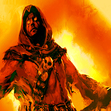My next book is a science fiction departure called CHESS, where the reader is shown a rather bleak future, near the end of the twenty-second century. It has aliens, lasers, genetically enhanced super soldiers, and even a starship narrowly escaping a black hole, so it's safe to say it isn't quite as "hard" as hack3r was.
That, however, is not the subject of my current blog post. The subject of the current blog post, is the board game, chess. I am wondering how it is that this game holds such a fascination for so many people, especially science-fiction writers. The game makes no sense on a practical level. The rook, which is presumably a castle wall, tower, or rampart, is one of the most mobile and aggressive pieces. The bishop, which is a priest, kills without regard. The King is utterly defenseless, and perhaps most realistically, the Queen pretty much runs the table.
So why is it so beloved, even by me, a crappy chess player? Why is it heralded as such a meter for intellect? Why is it practiced, and taught, and studied by many in more depth than religion.
And then, as I wrote CHESS

, I figured it out. There is something very human about this game. Something intangible, which connects it to our souls. It provides a feeling of control, but even in the absence of control, hope. A hope to improve, a new challenge to overcome. And it is that hope that makes chess great, and I hope it will make CHESS great to. Keep an eye out for it: it's less than a month from release.
 newest »
newest »
 newest »
newest »
 Can't wait for CHESS!
Can't wait for CHESS!





